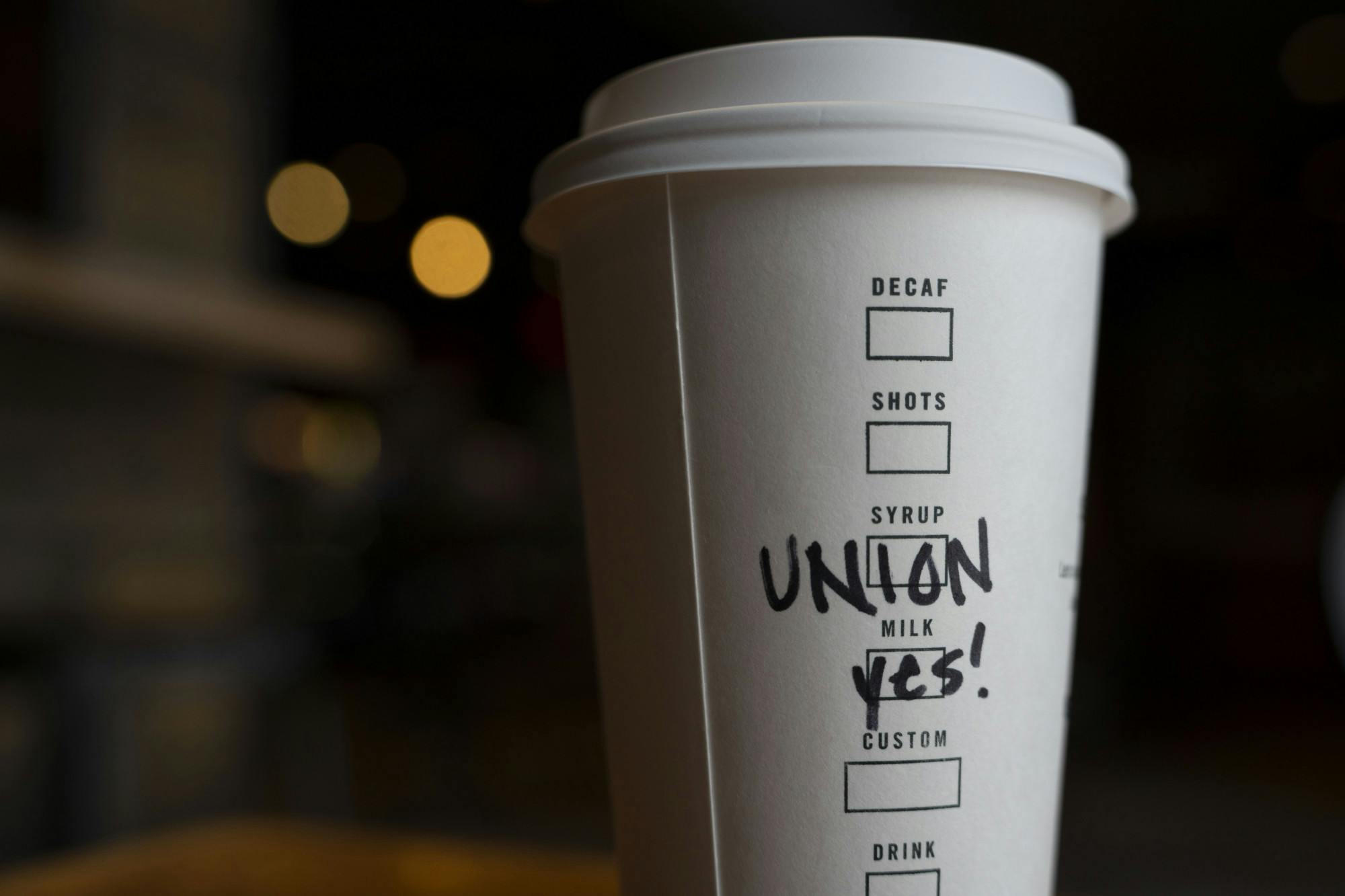On Feb. 4, workers at the Starbucks at Lake Lansing Street and Kerry Street filed for a union election with the National Labor Relations Board, joining at least 54 other Starbucks locations.
Workers said of the 42 employees, 32 have signed union cards, indicating they want an election to happen at the store. The petition was filed at 7 a.m. on Friday, Feb. 4.
The Lake Lansing Starbucks will be joining at least 54 other Starbucks locations throughout the country, filing for Workers United, a union that is affiliated with the Service Employees International Union, or SEIU, to represent them.
The Lake Lansing store will be the first Starbucks store in Lansing to file for an election and at least the fifth store in Michigan to file, following two locations in Ann Arbor, one location in Clinton Township and another in Grand Blanc.
The movement of organizing Starbucks originated in Buffalo, New York, where workers at two locations voted in December, winning a union. A third store in Buffalo voted against the union.
In a letter addressed to Starbucks CEO Kevin Johnson, the workers notified the company of their filing with the NLRB and demanded a say in decision making.
"Time and time again," the letter reads, "We have attempted to work with managers of all levels for store improvement, but little has been done to help those of us on the floor. ... We are now unionizing to hold Starbucks accountable and improve our workplace in the way we need. Our store fosters a very close community among partners, and we intend on standing in solidarity with each other through this process and beyond."
The letter is signed by 32 baristas and shift supervisors, including one anonymous partner.
Social relations and policy senior Grace Norris said some of the specific issues the workers at this Starbucks would like to see addressed are better staffing, length of breaktimes, food and drink benefits, less cost for their healthcare, as well as accommodations made for a deaf co-worker. Norris, a barista at the Lake Lansing Starbucks, is among the workers at the Lake Lansing Starbucks who has led organizing efforts.
“I have been a partner since September 2020,” Norris said. “You just see a lot of things happen to your co-workers that you disagree with. … I love my co-workers, that’s the most important thing. I think it’s important to try to make that workplace better for everyone who’s working there now and who will be there after we all leave.”
Social relations and policy junior Laila Galarsa said that the Lake Lansing Starbucks is among the busiest locations in Michigan. Many Starbucks are busiest in the morning, which is when they are fully staffed. But outside of those hours, the store faces constant understaffing.
Clinical social work graduate student Cassidy Thurmond said the understaffing paired with the fast-paced environment has led many baristas into burnout, causing them to break down and start crying while still clocked in. The environment, she said, is not friendly for newly hired employees because there is little leniency from the district manager.
Many times, Thurmond said, new hires would often be placed on the drive-thru window. But, that can be stressful, too, because of understaffing combined with the variety of tasks that are required to be done, including handling money, listening to customers’ orders in the headset and handing orders out of the window.
“All of that can get really chaotic if it’s very busy and you’re running around and trying to grab things and orders get handed out wrong and customers get upset,” Thurmond said. “A million things can happen, and having all of those things going on at one time cause some people to go into panic. We’ve had co-workers who have been so overwhelmed at the drive-thru that finally one more customer yells at them and they break down crying.”
Galarsa said that Starbucks has provided good benefits for its employees in the past, but the issue is that these benefits are not permanent. Starbucks can decide to just stop giving the benefit, and workers do not get a say.
Norris points to the food and drink benefits as an example of this. Norris said she used to be able to make her food item and her drink before starting her break. The worker could make both of them before stepping off the floor and eating on break or at lunch.
Now, at the Lake Lansing location, Galarsa said that there is not enough time for workers to receive a food item and drink during their break. Because of how busy this Starbucks is, the amount of time before the drink would come out would likely take longer than the 10 minutes allotted for a break. This becomes an issue because it means a worker may not be able to eat at all during a shift.
“Sometimes, you’re left hungry on the shift,” Galarsa said. “Breaks are just not long enough. You can’t finish your food mark out for the shift, you can’t finish your drink for the shift. You can’t even order sometimes.”
Thurmond also points out that the free food and drink was an important benefit for many Starbucks workers. Thurmond said Starbucks announcing the new, more restrictive policy around food and drink benefits was met with alarm by many of the workers because some of them were suffering from food insecurity.
The workers also are frustrated with the lengths of shifts. Working any shift means a worker is given a single 10-minute break. Working a six-hour shift means the worker is allowed a 30-minute lunch break in addition to the break.
Support student media!
Please consider donating to The State News and help fund the future of journalism.
The most common shift length assigned to baristas is around five hours and 45 minutes. Galarsa said that this is so Starbucks can work them just enough without having to provide them with the mandatory lunch.
As MSU students, Norris, Galarsa and Thurmond do not see Starbucks as the endpoint of their careers, but they still view unionization as an important step for creating better opportunities for the workers at the Lake Lansing store, both present and future. Galarsa said that it is important to be valued at your work, even if it is just a stepping stone in your career.
“All workers deserve to be treated with the utmost respect and be paid the way they should be,” Galarsa said. “And right now, we’re not.”
Thurmond recognizes that a union will not solve 100% of all problems faced by Starbucks workers. But she views it as a way of creating and ensuring a better environment while giving autonomy to the workers.
“You’re not walking on eggshells, waiting for the next thing to be taken away from you,” Thurmond said. “A union definitely isn’t going to solve everything overnight. But it gives partners the hope that they need to fight for the things they should already be having.”
Discussion
Share and discuss “Lake Lansing Starbucks workers file for union election” on social media.







